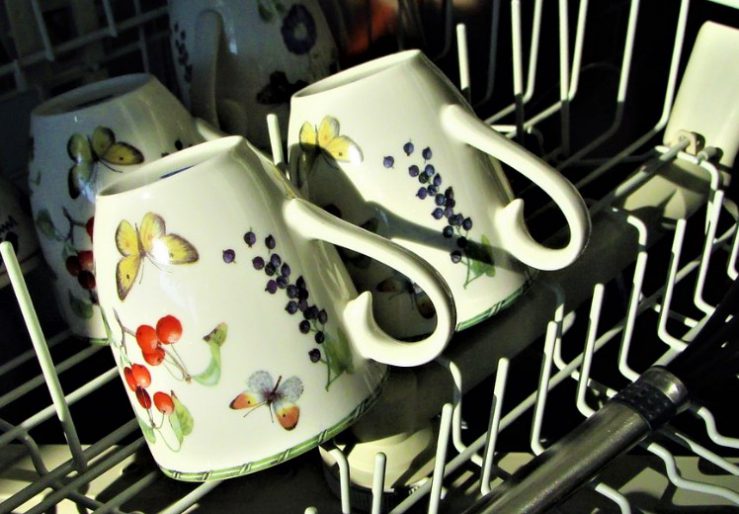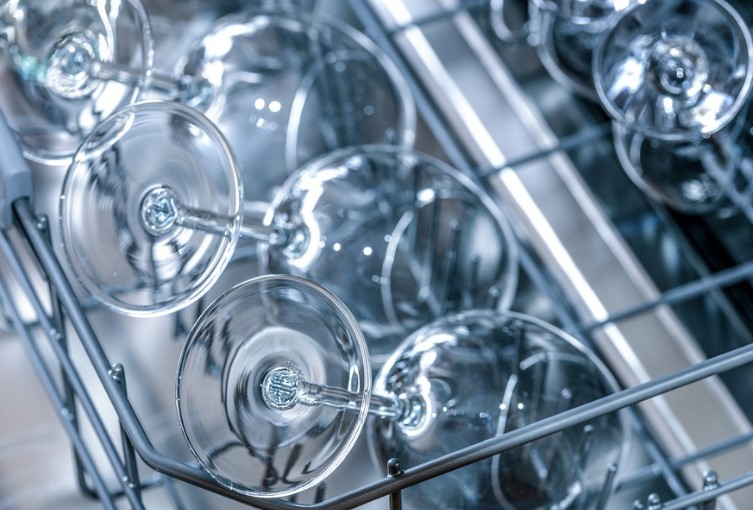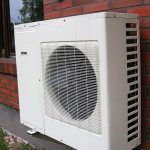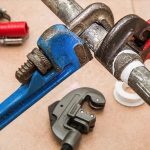Common Dishwasher Issues & How To Fix Them

If your dishwasher is not draining properly, not cleaning dishes properly, or water is leaking, then you may need to call a professional. Here are some common dishwasher issues and how to fix them.
Table of Contents:
Not Draining Properly
It’s no secret that dishwashers can be a pain sometimes. It seems like every time we turn on our machine, it’s flooded with water and dishes are everywhere. Here are some tips on how to prevent your dishwasher from not draining properly.
The most common reason as you can read in article from Forbes for a dishwasher not draining properly is a clogged drain. If you notice that your dishwasher is not draining as quickly as it used to, the first thing you should do is check the drainage system. There may be debris blocking the pipes, or there may be a faulty pump involved. In either case, you’ll need to call a plumber to take care of the issue.
Another common cause of dishwashers not draining properly is a faulty or damaged pump. If you notice that your machine isn’t pumping water through the dishes as quickly as it used to, there may be something obstructing the pump. You can try running a vinegar cycle – this will help remove any build-up – or replacing the pump altogether may be necessary.
If all else fails and your dishwasher still won’t drain properly, then you may need to call an expert! Dishwashers can get expensive pretty quickly if they need to be replaced multiple times due to drainage issues. Follow these tips and yours should stay operational for years to come!
How To Prevent Dirt And Heavy Buildup In The Dishwasher
There’s nothing worse than coming home to a dirty dishwasher. In fact, dishwashers are one of the most abused appliances in a home. That’s because people don’t take care of them – they don’t clean them often enough, and they let dirt and heavy buildup build up over time. Not only is this frustrating for the homeowner, but it can also be dangerous for the dishes that are being washed.
Below, we’ll outline the steps that you need to take in order to keep your dishwasher clean and in good condition. First, make sure to clean it regularly – at least once every week. Second, avoid putting dirty dishes in it – especially if they have food on them. This will cause bacteria to grow and create dishwasher problems. Finally, follow these tips for keeping your dishwasher clean so that it lasts longer: use detergent sparingly; fill the machine only three-quarters full; run a cycle with just water instead of detergents; and spray down the machine with a hose after each use.
Now that you know how to keep your dishwasher clean, be sure to enjoy all of its benefits!
Not Cleaning Dishes Properly
Most people know that it’s important to clean dishes by hand, but few are aware of the many problems that can occur when dishes are not properly cleaned in the dishwasher. In this section, we will outline some of the most common dishwasher problems and how to fix them.
One of the most common causes of dishwasher performance problems is dirty dishes. Dirty dishes contain oils and residues from food that can gum up the machine and cause it to stall or fail. To prevent this from happening, make sure to wash all your dishes in cold water before putting them in the dishwasher. This will help to remove any oils and residues from the food, giving your machine a clean start.
Another common problem is overloaded machines. Overloaded machines can’t handle large loads very well, which causes them to struggle with cleaning dishes properly. To prevent this from happening, always use the recommended number of cups or plates per cycle on your machine. Also, make sure that all your utensils and cookware are placed inside the washing compartment before starting your cycle.
Regular dishwasher maintenance is also important for keeping your machine running smoothly. Every six months or so, take time to run a full cycle with a cleaning solution specifically designed for dishwashers (these solutions are available at most hardware stores). This will help to remove any built-up dirt, grease, or debris from inside the machine – ensuring peak performance every time you use it!
Common Dishwasher Issues & How To Fix Them
There are a lot of different things that can go wrong with a dishwasher, and sometimes it can be difficult to know what to do. That’s why we’ve put together this helpful guide on how to deal with common dishwasher issues.
If your dishwasher doesn’t start, try turning it off and then back on again. If that doesn’t work, try checking for power sources near the dishwasher and make sure that they’re properly plugged in. If all of those things check out, then you may have a problem with the dishwasher’s electrical system.
If your dishwasher is leaving spots on dishes or is dirtying them quickly, you may need to adjust the water level or the cycle time. You can also try using a cleaner specifically designed for dishwashers or trying a different detergent. If your dishwasher still isn’t cleaning dishes effectively, you may need to replace its filter or pump.
If water is leaking onto the floor from your dishwasher, there are several things that you can do to fix the issue: check for clogs in the tubing system, replace worn parts on the valve assembly inside of the machine, or replace broken seals around joints and fittings in the piping system. Finally, if your dish washer smells bad – like something is burning – there could be food residue stuck in the spray arm and/or filters cartridge(s). In order to clean these areas properly, you will need some special cleaners and degreasers.
Water Leaks
No matter how careful you are, it’s inevitable that water will leak from your dishwasher at some point. Luckily, repairing leaks is relatively easy and can be done by just a few simple steps. Here are the most common causes of dishwasher leaks and how to fix them.
The most common reason for leaks is a damaged seal. If you see water leaking from your dishwasher, the first thing to do is check the seals. If the seals are damaged, they will need to be replaced. Another common cause of leaks is a clogged drain. If your dishwasher is leaking, be sure to check for a clogged drain. Finally, if your dishwasher is leaking, it could be due to a faulty gasket. If you have a dishwasher that is leaking, be sure to check all of these potential issues before calling a repairman. Leaks can be a serious problem, so it’s important to be proactive in addressing them!
Causes Of Water Leaks In The Dishwasher And How To Fix Them
Dishwashers can be a lifesaver on a hot day, but they can also be a source of frustration. They work well, but they can often leak water if the seals are worn out, the overflows are blocked, or the pump is broken. In this section, we will outline some of the most common dishwasher problems and how to fix them.
One of the most common causes of water leaks in dishwashers is worn out door seals. If the seal around the door is worn down or missing, water can seep through and cause leaks. It is important to replace this seal as soon as possible in order to prevent further water leakage.
Another common issue with dishwashers is faulty overflows. If the overflow isn’t properly catching all of the food waste from your dishes, it will eventually block and lead to water leaks. It’s important to check your overflows every month and clean them if they are clogged up – otherwise you could end up with a flooded dishwasher!
If your pump is damaged, it will not be able to move enough water through your dishwasher to wash dishes properly. This can lead to leaking from both the machine and from around external seals like door hinges and corners. If you notice that your pump is struggling to move water through your dishwasher, it might be time for a replacement!
Finally, if you notice that one or more inlet hoses have started leaking over time, it might be time for a replacement. These hoses connect your dishwasher plumbing system to the inside of your machine – if they’re leaking badly, it will cause flooding and damage throughout your appliance. Replace these hoses as soon as possible in order not only to stop any further damage but also to improve performance overall!
Not Turning On
If your dishwasher is not turning on, there may be a problem with one of the following: the power source, water supply, leaks, drainage hose, or control panel. Follow these five easy steps to find and fix the issue.
- Check the power source – Make sure that the dishwasher is plugged into an outlet and that the power cord is securely plugged in.
- Check the water supply – If you are using a municipal or natural gas dishwasher, make sure that there is enough pressure in the water line to run the dishwasher. If you are using a kitchen faucet or well pump to get water to your dishwasher, check for leaks around the faucet or well pump before trying to start it up.
- Check for leaks – Look for any signs of water leaking from around dishes and appliances in close proximity to where your dishwasher is supposed to be located. Fix any leaks before starting up your machine by replacing any damaged parts with new ones.
- Check for drainage hose – If your dishwasher has a drainage hose attached it should be attached snugly at both ends and should be kept clear of obstructions such as tree roots or heavy snowdrifts. If there are obstructions blocking the drainage hose, it may need to be replaced altogether.
- Check control panel – Make sure that all buttons are working properly by pressing them and checking for lights that should turn on when they’re activated (like Start). If everything looks good on paper but your machine still won’t start up, it may be due to an issue with one of these components inside of the control panel.
Final Thoughts
If your dishwasher isn’t draining properly, it could be because of a few different things. First, check to see if there is anything blocking the dishwasher’s drain. If there is, clear it away and try again. If that doesn’t work, you may need to call a professional to take a look at your dishwasher.









